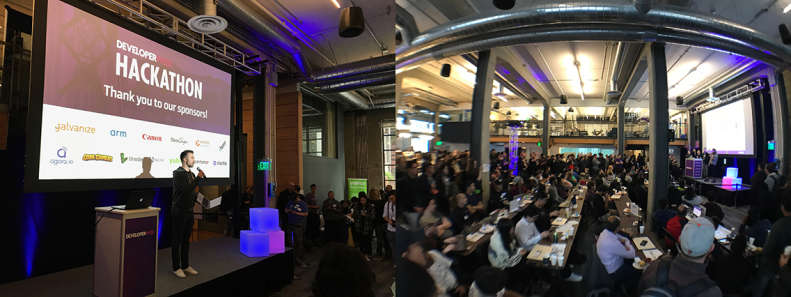DeveloperWeek 2019 Hackathon Recap
For the third year running, DocuSign sponsored the nation’s largest challenge-driven hackathon located in the heart of San Francisco, the DeveloperWeek Hackathon. Attracting over 400 attendees from all over the country, the event encourages attendees to tinker with new, innovative technologies, network with like-minded developers, and win thousands of dollars in prizes!
Our Challenge
In 2018, “bleeding-edge” technologies like artificial intelligence, blockchain, and Internet of Things(IoT) became a focal point in the development community. Recognizing this, DocuSign challenged hackers to utilize advanced features of our eSignature API in conjunction with these technologies to solve real-world problems. We were astounded with what 34 teams were able to accomplish in under 24 hours using our API and SDK’s.
Our Prize (and SWAG)
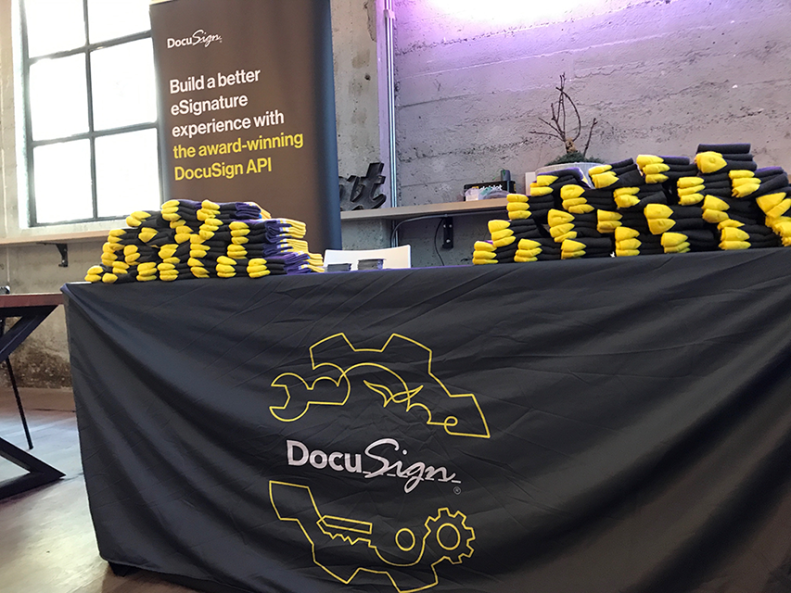
When it comes to hackathon prizes, we’ve learned that cash is king. 1st prize for Best Use of the DocuSign eSignature API was a hefty $2500, 2nd place was $1000 and 3rd place was $500. Even if you didn’t win a prize, we had plenty of swag to give away! Shortly after the hackathon began, we distributed all 250 pairs of our coveted DOCUsocks and 300 stickers!
Our Workshop
On Day 1, the “dream team” Matt King, Program Manager of Developer Content, and Matthew Roknich, Developer Evangelist co-hosted a Getting Started Workshop to get developers set up and sending API requests within minutes.
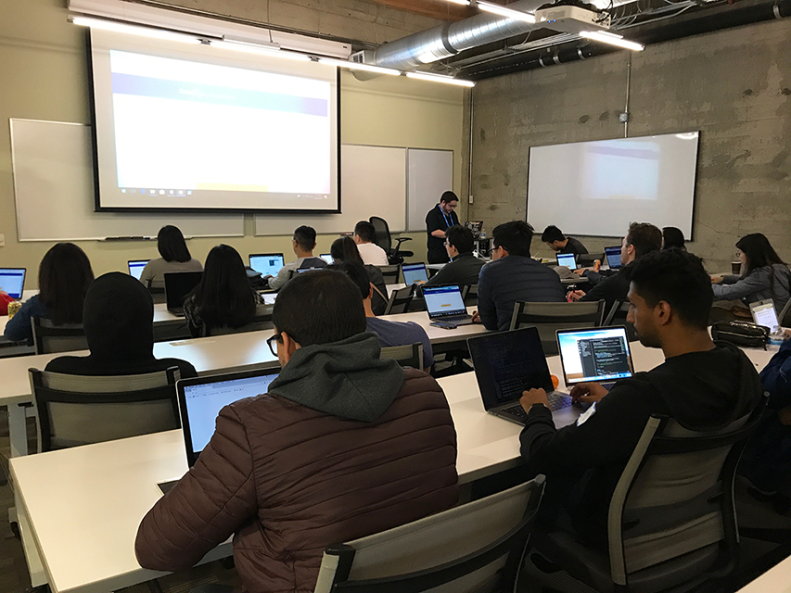
In the workshop, Matt R. covered various DocuSign product offerings and specific features that developers can implement with our eSignature API. Matt King then demonstrated how to create a sandbox account, generate an integrator key, and send your first envelope for signature using a template in Node.JS.
Didn’t get a chance to attend the hackathon or workshop? Check out the hackathon getting started repo to clone the source!
Honorable Mentions
When time was called, there were 34 total submissions that used our eSignature API to automate an agreement or workflow. Because it was so difficult to select our winners, we want to give a special shoutout to a couple of honorable mentions first before revealing the winners.
Urgent Blood (pictured right)
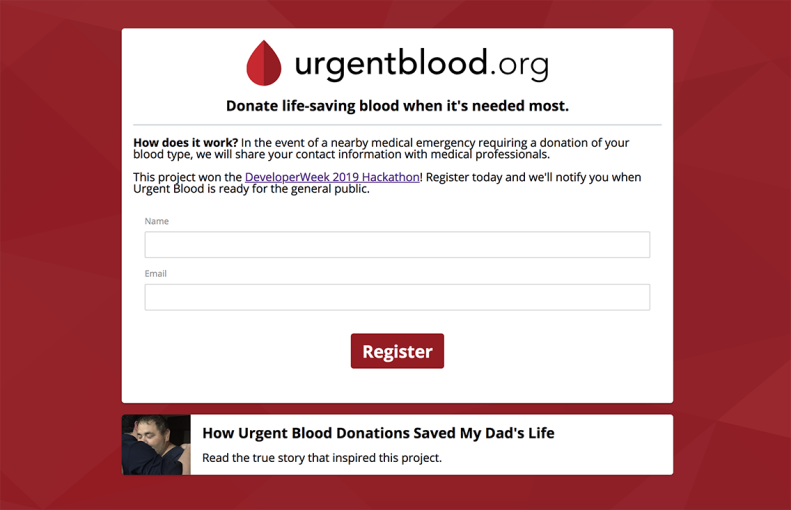
UrgentBlood.org created an application that connects blood donors with patients in need of urgent donations. Donors register by verifying their identity with DocuSign phone authentication, certifying their eligibility to donate using DocuSign embedded signing and custom branding, and sharing their location into a blockchain-backed database using NEAR. Medical professionals can then log in with a Yubikey OTP to locate eligible donors within a certain range of the hospital's geofence, and even provide directions.
You Snooze You Lose!
Waking up in the morning is tough. You Snooze, You Lose is a mobile alarm app that helps you get out of bed by making it costly to hit snooze. The alarm continues to ring until you take a photo of a predefined household item that’s out of reach. The app uses the Clarifai image recognition API for the match. If you choose to snooze, you will be directed to sign an agreement using the DocuSign eSignature API legally binding you to pay a friend (with DocuSign payments) before the alarm is disabled.
The Winners!
3rd Place - Photobot
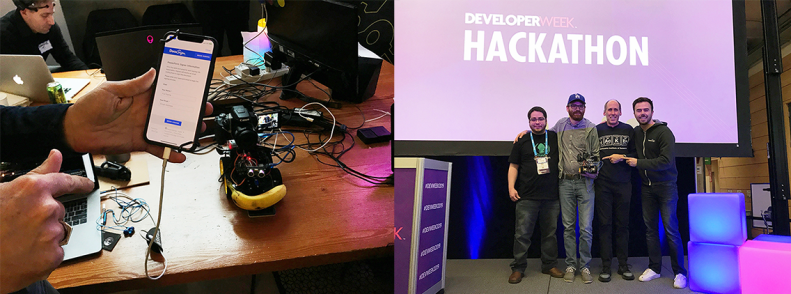
PhotoBot is an automated photographer for events. It consists of a Canon camera, Raspberry Pi mounted on a motorized robot, and a mobile app. The mobile application enables users to enter events, view photos, control PhotoBot motion and command the camera. The Pi controls the camera, converts media pulled from the camera via the Cannon API, broadcasts a stream of this content using Wowza, moves the robot either automatically or on-demand by users of the app, and provides an API for app integration. Photos are processed with Clarifai to identify people in the scene and tag them for later sorting. Photobot then makes good use of the iOS offline signing SDK to automatically route model release forms for eSignature.
2nd place - PNI Elementary School Portal
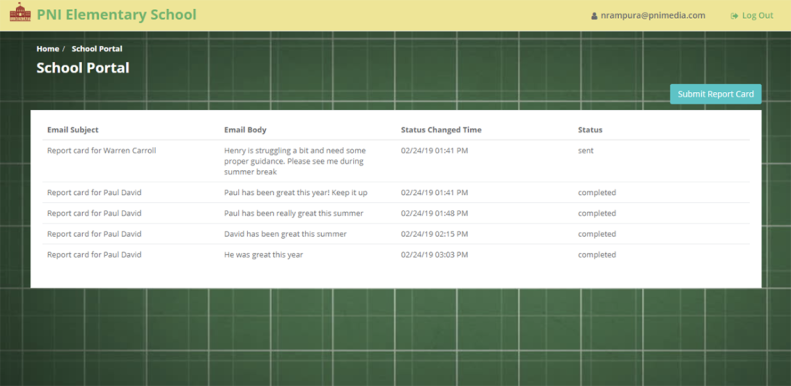
The PNI team recognized that report cards, writeups, and other important schools documents often “get lost” on the way home. To solve this problem, the team created a web application that serves as a digital line of communication between students, parents and teachers. Parents can sign report cards of their children online that are sent by teachers, while teachers can approve/decline leave requests with signatures submitted by parents via the same portal. The agreements were all managed using the DocuSign eSignature API.
1st place - Pandemic!
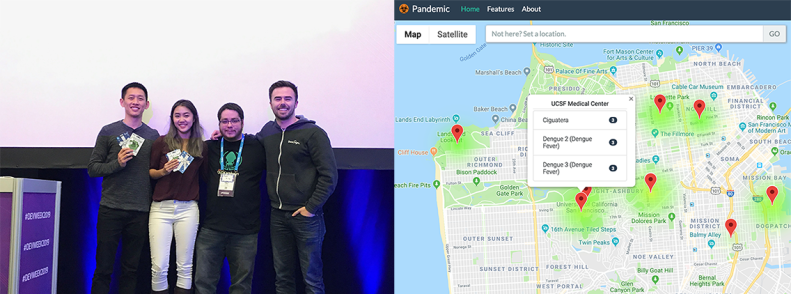
The Pandemic team identified that paper processes jeopardize the lives of many, especially when it comes to infectious diseases. Their application aimed to prevent the spread of diseases by crowdsourcing data from hospitals and making diagnoses available to doctors starting with patient zero. With real-time disease trends (utilizing HERE’s location API), doctors can more accurately respond to cases by ordering the correct diagnostics. Pandemic also notifies doctors if a case should be reported to CDC (as required by law) and allows them to seamlessly complete and send the form on the platform using DocuSign. We were especially impressed with Pandemic’s creative use of advanced eSignature API functionality, including embedded signing, composite templates, and list envelope status.
Additional Developer Resources:
- Developer events
- Clone the workshop repo
- DocuSign developer blog
- DocuSign developer newsletter signup
- DocuSign Developer Center
- @DocuSignAPI Twitter handle
- DocuSign Developer Facebook page
Matthew Roknich is Developer Evangelist and a lifelong problem solver. His current projects outside of DocuSign involve advanced IoT and sustainability. He can be found on a soapbox talking about the eSignature API at a variety of developer conferences, hackathons, and meetups.
